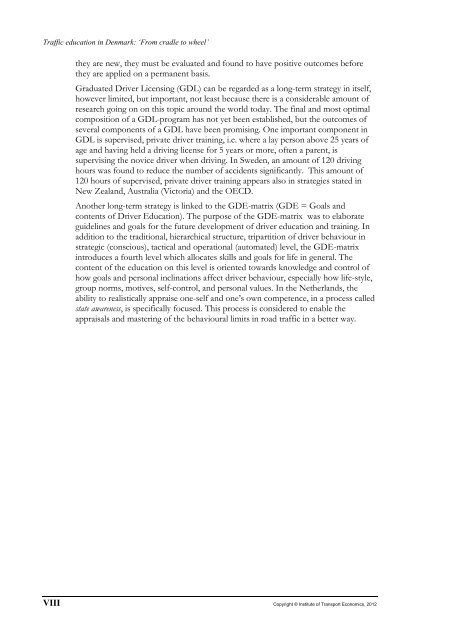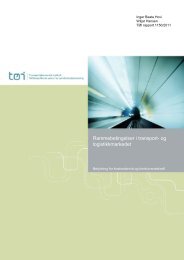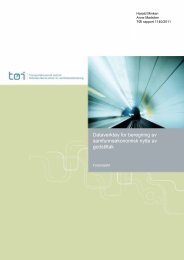Trafikkopplæring i Danmark 'fra vugge til rat' - Transportøkonomisk ...
Trafikkopplæring i Danmark 'fra vugge til rat' - Transportøkonomisk ...
Trafikkopplæring i Danmark 'fra vugge til rat' - Transportøkonomisk ...
You also want an ePaper? Increase the reach of your titles
YUMPU automatically turns print PDFs into web optimized ePapers that Google loves.
Traffic education in Denmark: ‘From cradle to wheel’<br />
they are new, they must be evaluated and found to have positive outcomes before<br />
they are applied on a permanent basis.<br />
Graduated Driver Licensing (GDL) can be regarded as a long-term strategy in itself,<br />
however limited, but important, not least because there is a considerable amount of<br />
research going on on this topic around the world today. The final and most optimal<br />
composition of a GDL-program has not yet been established, but the outcomes of<br />
several components of a GDL have been promising. One important component in<br />
GDL is supervised, private driver training, i.e. where a lay person above 25 years of<br />
age and having held a driving license for 5 years or more, often a parent, is<br />
supervising the novice driver when driving. In Sweden, an amount of 120 driving<br />
hours was found to reduce the number of accidents significantly. This amount of<br />
120 hours of supervised, private driver training appears also in strategies stated in<br />
New Zealand, Australia (Victoria) and the OECD.<br />
Another long-term strategy is linked to the GDE-matrix (GDE = Goals and<br />
contents of Driver Education). The purpose of the GDE-matrix was to elaborate<br />
guidelines and goals for the future development of driver education and training. In<br />
addition to the traditional, hierarchical structure, tripartition of driver behaviour in<br />
strategic (conscious), tactical and operational (automated) level, the GDE-matrix<br />
introduces a fourth level which allocates skills and goals for life in general. The<br />
content of the education on this level is oriented towards knowledge and control of<br />
how goals and personal inclinations affect driver behaviour, especially how life-style,<br />
group norms, motives, self-control, and personal values. In the Netherlands, the<br />
ability to realistically appraise one-self and one’s own competence, in a process called<br />
state awareness, is specifically focused. This process is considered to enable the<br />
appraisals and mastering of the behavioural limits in road traffic in a better way.<br />
VIII Copyright © Institute of Transport Economics, 2012







